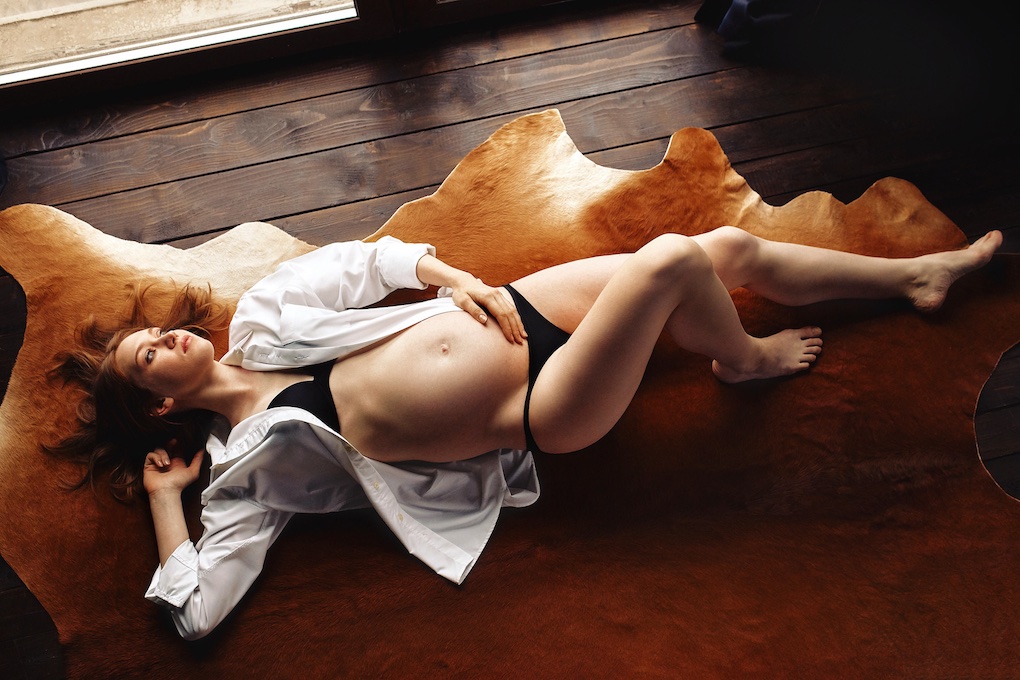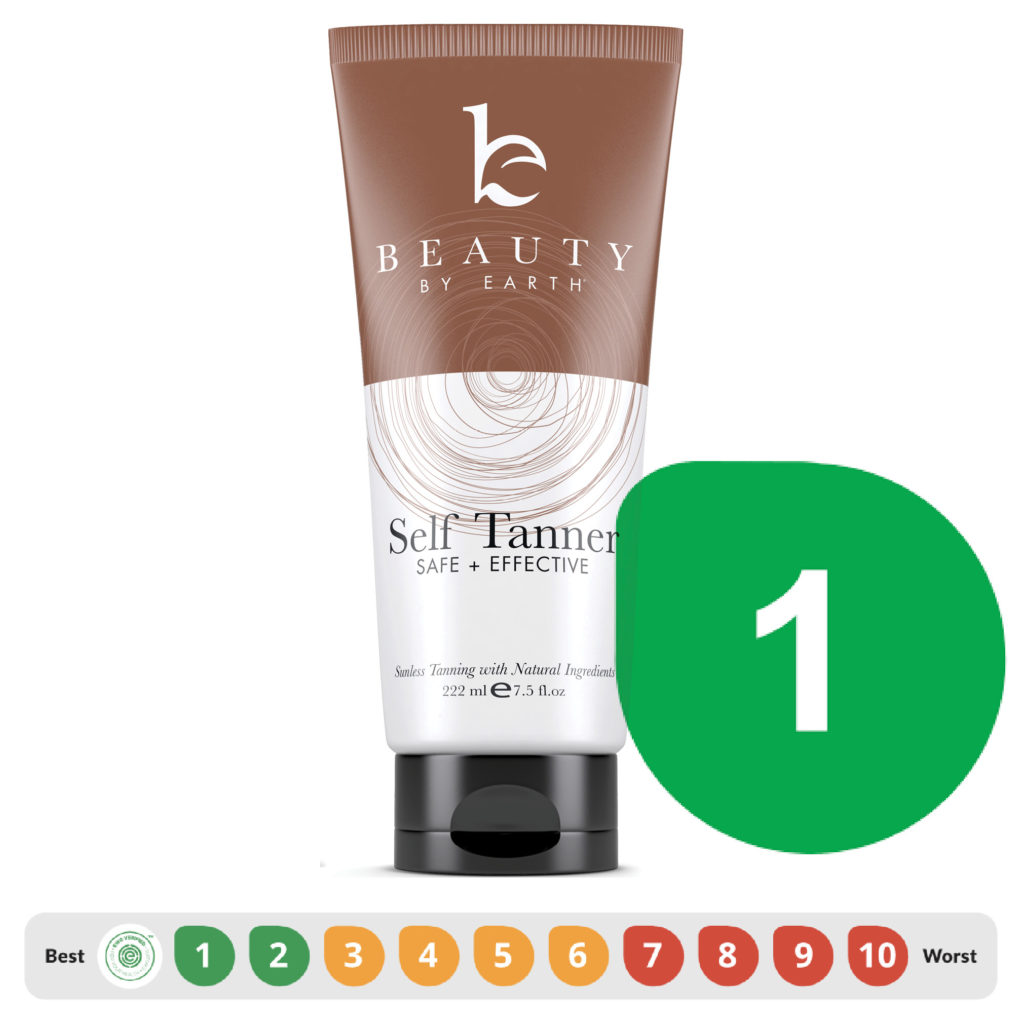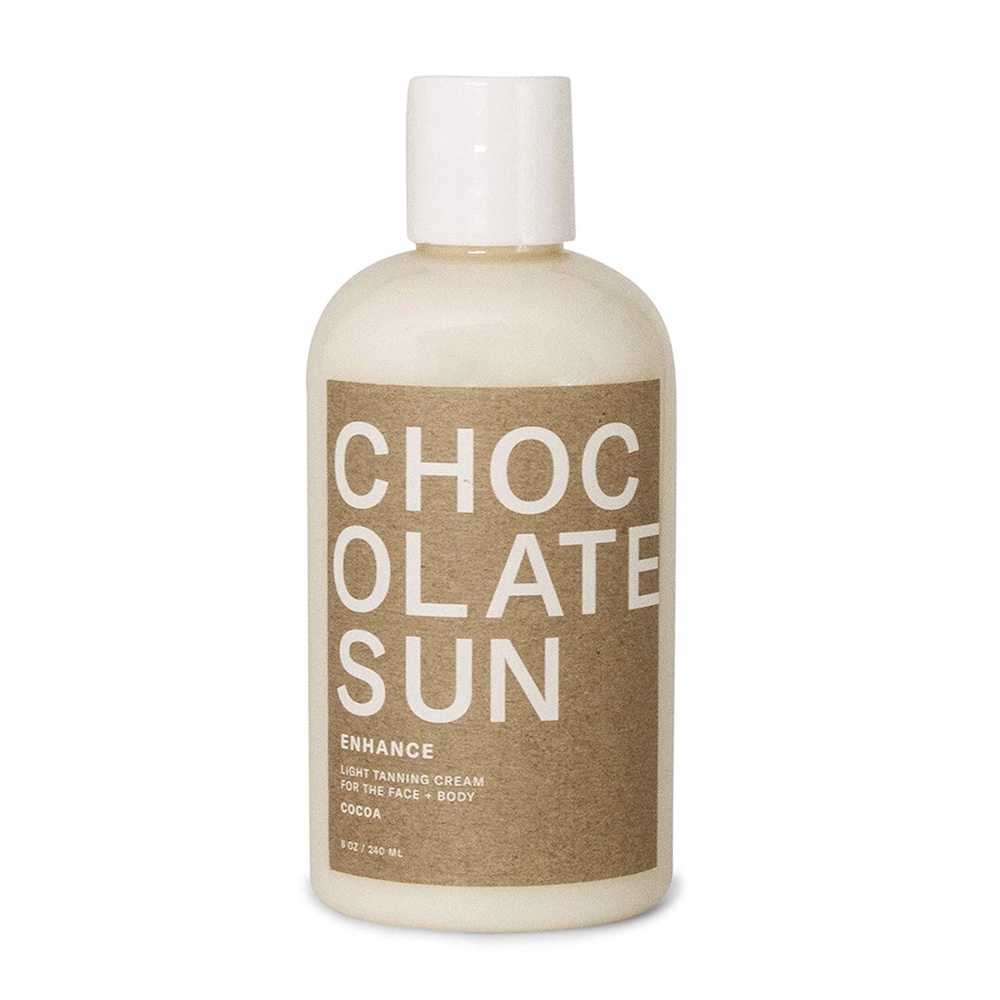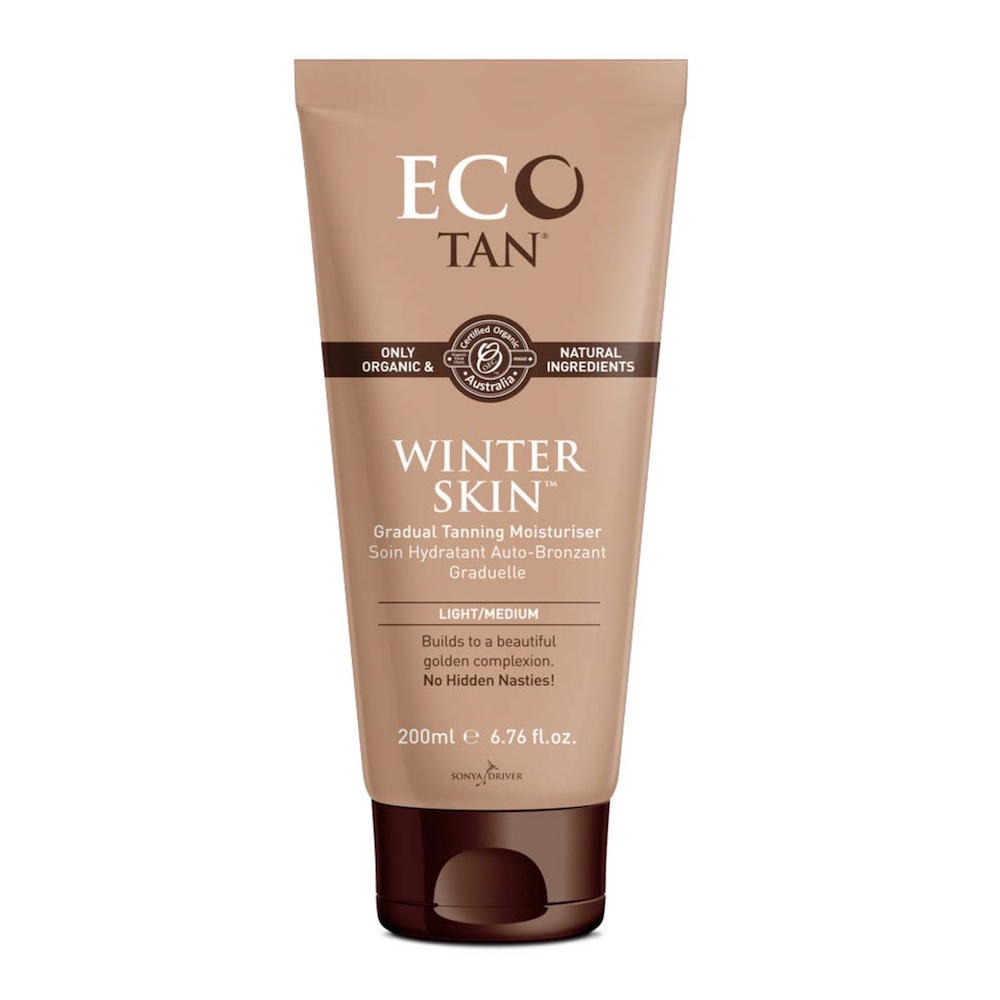Want to look like the blossoming babe you are for your gender reveal, baby shower, day of delivery, and every snapshot or selfie throughout your pregnancy?
You’ll need a good pregnancy-safe self-tanner.
Most ‘Pregnancy-Safe’ Self-Tanner Lists are ‘Toxic’
I’ve spent hours reviewing self-tanners—and reviews of self-tanners—and have yet to find a list of “pregnancy-safe self-tanners” backed by evidence of much critical research.
Sources simply tell you self-tanners are “pregnancy-safe,”—”but check with your doctor”—and then proceed to list out 15-20 random self-tanners, most of which are nowhere near clean or natural.
After all, isn’t that why we’re looking for something pregnancy-safe in the first place?
Sure, with enough warnings, they’re all technically “pregnancy-safe,” since their most common active ingredient, DHA, is considered safe to use on your skin while pregnant—but the problem is that so many of the other ingredients aren’t ideal, whether you’re pregnant or not.
But especially when you’re pregnant!
Here’s a great example:
“Chances are the quantity is minuscule, but it is potentially toxic to fetuses.”
– Ingredient discussed on a list of “Pregnancy-Safe” Self-Tanners
It shows how much these lists are about gaming Google (and you), rather than providing an educated product recommendation.
“Gosh dang it, I’m flipping pregnant,” I want to scream. Only less euphemistically. “I. Have. A. Baby!”
And that’s not an isolated example:
“Butylphenyl Methylpropional may cause harm to a fetus during pregnancy.”
– Ingredient discussed on a list of “Pregnancy-Safe” Self-Tanners
And one more:
“Phthalates should be avoided during pregnancy.”
– Ingredient discussed on a list of “Pregnancy-Safe” Self-Tanners
Since almost all self-tanners revolve around DHA, and since DHA is ‘Generally Recognized as Safe,’ what actually factors into a “Pregnancy-Safe Self-Tanner” are the many other ingredients used.
Time crunched? Order our #1 choice or watch our video.
Self-Tanners to Avoid While Pregnant?
So let me share a couple of self-tanners that I wouldn’t use during pregnancy.
They aren’t horrible.
They aren’t even terribly unsafe in the short term. (Some of what you’ll be told is safe is actually wretched, stinky, and dirty.)
But I know there are far better options available while I’m bearing a child.
1. Coco & Eve Self-Tanner
Coco & Eve uses synthetic color dyes, fragrance, and 3 ingredients specifically not recommended for use while pregnant.
(We write about this in so much detail here: “Is Coco & Eve Self-Tanner Pregnancy-Safe?”)
2. Skinerals Self-Tanner
Skinerals’ self-tanner contains FD&C color blends whose ingredients are unknown and unlisted, as well as propylene glycol, phenoxyethanol, Polysorbate 80, and fragrance. These aren’t clean and aren’t necessary in a self-tanner.
Skinerals previously used the tagline “Organic Skin Science,” so I reached out and asked which of their self-tanner ingredients are organic. “Indian Gooseberry, Acai Berry, Fig Extract, and Goji Berry,” they said.
These four ingredients are next-to-last on the ingredient list, and so sound great but likely comprise less than 0.05% of the product, and are of no tangible benefit to the user.
Skinerals has since changed their tagline to remove “organic.”
3. Miami Gorgeous Self-Tanner
Miami Gorgeous’ Instant Self Tanner Bronzing Mousse is free of parabens, sulfate, and gluten, and is vitamin-enriched. It’s also made with a few organic ingredients. But it uses fragrance and four color dyes that aren’t clean. So why use it during pregnancy?
4. St. Tropez Self-Tanner
I wouldn’t use this while pregnant either. Ingredients that stick out include propylene glycol, glycerin, phenoxyethanol, fragrance, sodium metabisulfite, and the color dyes / “color indexes,” CI 14700 (Red 4), CI 19140 (Yellow 5), and CI 42090 (Blue 1).
What most self-tanners have in common is an active ingredient widely acknowledged as typically not harmful (DHA), surrounded by ingredients that are widely acknowledged as potentially harmful. Synthetic fragrances, color dyes, parabens, petroleum, phthalates, sulfates, and formaldehyde are best avoided whether you’re TTC or expecting or not. Finding a good pregnancy-safe self-tanner means finding the few that safely strayed from industry norms.
The Best Pregnancy-Safe Self-Tanners:
Best-Rated & Most Popular Pregnancy-Safe Self-Tanner:
1. Beauty By Earth Self-Tanner: 81% Organic
Beauty By Earth’s Self-Tanner is not only an extremely clean and natural self-tanner, but it works extremely well and provides a long-lasting and natural looking golden bronze hue for about 7 days.
The product is a thick white lotion-like cream that can be applied after showering and before going to sleep and it won’t stain your sheets (if left to dry to the touch, which should take about 15 minutes.)
In our use and review of this product, we listed out every single ingredient used in all of the 10 bestselling self-tanners on Amazon and assigned a number to each ingredient from cosmetic-safety group EWG.
Beauty By Earth self tanner had the best (safest) ingredient rating of them all. This self-tanner also doesn’t suffer from a problem that so many others do: It won’t leave your skin looking orange and awkward, but golden and tan.
It can also build upon itself: If you want to go darker, simply wait a day and add another coat of the product.
Whether you’re a women who’s just looking for a great tanner for a natural golden glow or are extremely conscious of ingredients and what you put on your skin and body during your pregnancy, this self-tanner should work great for you.
This is the cleanest self-tanner available on Amazon (or elsewhere) and it includes no sulfates, parabens, harsh chemicals, synthetic fragrances, or other ingredient to avoid while pregnant. It’s non-streaking and non-toxic.
Best Dual-Use Pregnancy-Safe Self-Tanner for Face & Body:
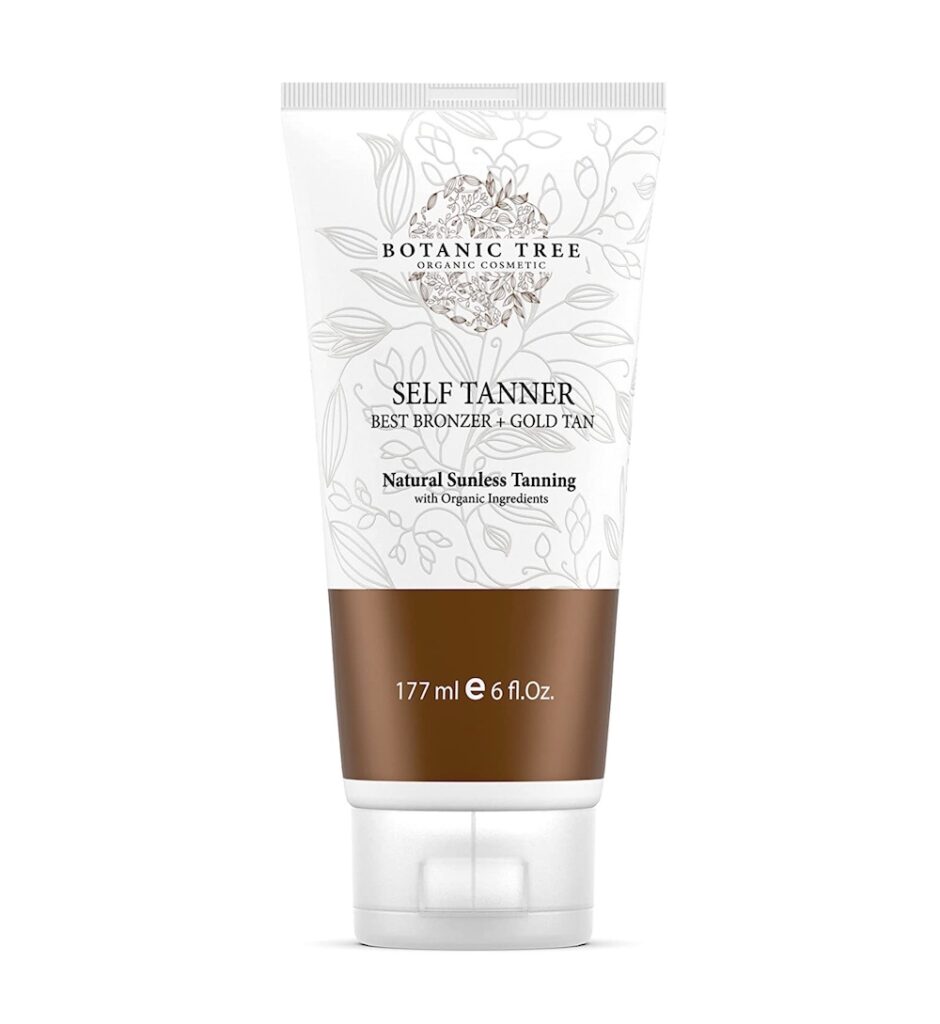
2. Botanic Tree Self-Tanner: 100% Organic
A great self-tanner for general use or while pregnant, Botanic Tree self tanner is made with 100% organic ingredients.
The longer-than-average application time is made up for by its great natural smell and the fact that it can be used both on your body and face.
The bronze it gives it a medium and natural looking glow that isn’t orange or ugly.
It also doesn’t streak but be sure to exfoliate beforehand and to put lotion in overly dry areas of skin, like your elbows and knees.
If in doubt, apply less of the product than you think you’ll need as you can also apply a second or third coat to darken the golden glow.
Being 100% organic, Botanic Tree’s Self-Tanner is free of everything you’d need to be worried about during pregnancy: No parabens, no sulfates or phthalates, no BHT or BHA, zero synthetic dyes (it’s a white cream unlike other products that include brown dyes that are always unnatural) and zero fragrances.
It won’t stain sheets or clothes if left dry to the touch before getting in bed.
Best Pregnancy-Safe Self-Tanner for Boujee Babes:
3. Chocolate Sun Self-Tanner: 92% Organic
With no parabens, mineral oil, dye, alcohol, SLS, and petrochemicals, this is a great self-tanner that’s also highly moisturizing.
Smooth, even, gradual tanning that’s buildable. Won’t clog pores. Cruelty-free. Vegan. Great company ethos. U.S.-grown ingredients. Beyond being just a great user-friendly self tanner that looks good, lasts long, and leaves no streaks,
Chocolatee Sun is also a great moisturizing lotion with plenty of wild and organic herbs that help and hydrate your skin. You can use this as often as you like for a light tan that gradually grows darker.
Exfoliate before applying for the best results, and let the self-tanning lotion just soak into your skin rather than vigorously rubbing it in. If you plan to use this without tanning mitts, be sure to wipe your hands off often with a wet cloth, because it will otherwise leave them looking discolored.
As with all self-tanners, you will want to shower and moisturize before applying this, and be careful to apply a bit more lotion (your moisturizer) in the always-dry areas of your body like the top of your hands, your elbows, and your knees.
Best Pregnancy-Safe Self-Tanner for Fair-Skinned Babes & Cautious 1st-Time Users:
4. Eco Tan Winter Skin Self-Tanner
With certified organic and all-natural ingredients and no harsh chemicals, Eco Tan’s “Winter Skin” is great for a gradual build and glowing bronze on fair skin users. Triple award-winning. Australian. Vega. Cruelty-free. Nice natural fragrance overtone (rose geranium) that helps eliminate the traditional ‘fake tan smell’
Other Self-Tanners to Consider
Aside from those specifically listed above, which we’ve extensively reviewed and used, the best pregnancy-safe self-tanner would be:
- A cream, not a spray-on aerosol, or a tanning bed.
- A natural or organic cream or lotion with a small percentage of naturally-derived DHA (dihydroxyacetone).
- As clean, natural, or organic as possible.
- Free of synthetic fragrances and dyes.
- Free of toxins and harmful chemicals like sulfates, parabens, phthalates, formaldehyde, and formaldehyde releasers.
- Unable to harm or affect the fetus, in accordance with current science.
- Transparent, providing complete ingredients in product listings and literature. (If you have to zoom in on an Amazon photo and the single ingredient actually listed in text is “aloe vera,” or “coconut oil,” or “coenzyme q10”, that’s a red flag, and yes, these are actual examples.)
How to Apply Self-Tanner While Pregnant
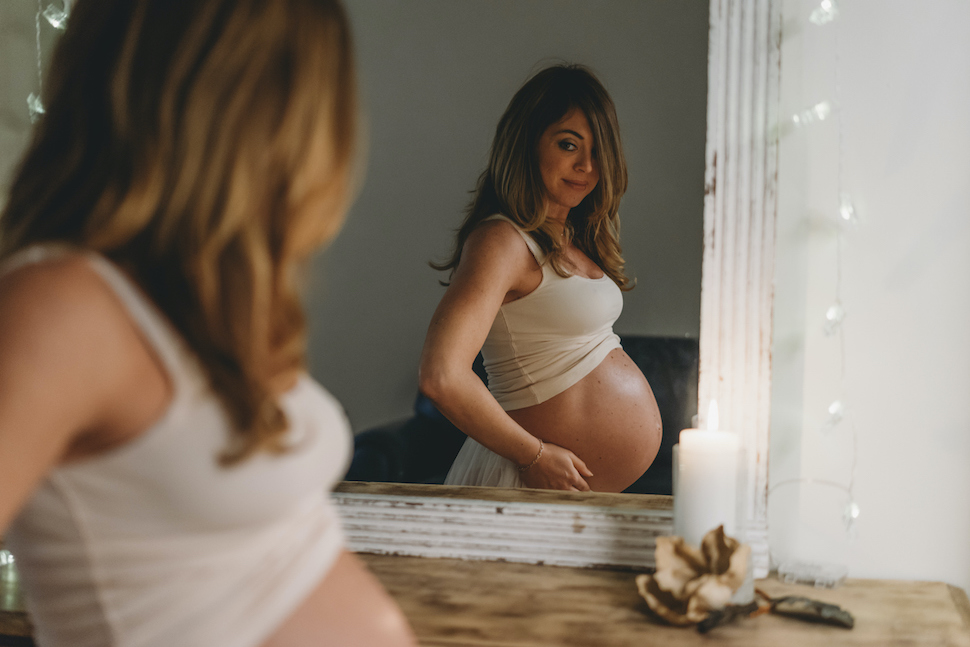
You can apply a pregnancy-safe self-tanner perfectly by doing the following:
- Exfoliate • Exfoliate your skin and shave the day before you plan to apply self-tanner.
- Moisturize • Apply a bit of moisturizer to the typically dryer areas of your body including your knees, wrists, elbows, and hands.
- Mitt • Using a self-tanning mitt, apply the self-tanner to your skin while it’s nice and dry; no moisturizer residue or shower mist.
- Rub in circles • Rub in circular motions and move from the legs upward. Do one section at a time before moving on: legs, abs, arms, etc.)
- Mind the dryer spots • Use less self-tanner on the dryer areas like your elbows, wrists, knees, and hands (since these areas soak up more self-tanner than the rest of your skin will).
- Let the tan begin • Leave the self-tanner on for anywhere from 2 – 6 hours, depending on what your self-tanner suggests since each is different.
- Rinse • Rinse the self-tanner off with warm water (not hot) and pat your skin dry.
- Moisturize • For the best and longest-lasting results, use a good moisturizer daily.
Pregnancy Safe Self-Tanner Tips, Tricks & Cautions
- Avoid contact with your eyes and hair.
- Don’t use self-tanning lotion on broken or irritated skin.
- Wash your hands right after use. (Better yet, use a self-tanning mitt).
- Wear sunscreen when you go out since self-tanner doesn’t prevent sunburn.
- You can tone and contour your tan by brushing on a self-tanner with a kabuki brush.
- Use less self-tanning lotion in areas that would naturally be hit by less sun—like the undersides of your arms.
Are Self-Tanners Safe During Pregnancy?
Generally, yes, self-tanners can be made pregnancy-safe, but ask your OB/GYN for case-specific advice. It helps to know the current general consensus of the medical/professional community, though it’s likely your attending OB/GYN will simply suggest you avoid tanning beds and tanning pills but may allow for safe self-tanning lotions. (Tanning beds and tanning pills are never safe, pregnant or not.)
Current professional consensus on self-tanner safety during pregnancy:
- U.S. FDA: “Risks, if any, are Unknown” (No Position on Self-Tanner Safety During Pregnancy)
- American Pregnancy Association: “Sunless Tanning Lotions May Be the Best Option”
- UK National Health Service: “Generally Considered Safe, Can’t Harm Your Baby”
- Sandra Marchese Johnson, M.D., FAAD: “Harmless. Fine to Use During Pregnancy & Won’t Harm Developing Baby”
- Mayo Clinic: “Generally Considered Safe If Used As Directed”
- Healthline: “Generally considered safe during pregnancy. Main chemicals don’t absorb past the first layer of skin.”
- Dr. Dray, M.D., Board-Certified Dermatologist & Skin Care Expert: “Very, very safe…. “I strongly advocate sunless tanners over [natural suntans or any other kind of tanning product.]”
- Board-certified dermatologist Dr. Shereene Idris: “[DHA-based] self-tanners: totally safe in pregnancy.” –
Let’s look at each of these statements in detail.
What the Best Experts Say About Pregnancy-Safe Self-Tanners

“Risks, if any, are Unknown,” (No Position on Self-Tanner Safety During Pregnancy) – U.S. FDA
As far as laws and the FDA are concerned, “Sunless Tanner” and “Bronzer” are both non-entities; that is, unlike medical devices, these cosmetic categories are utterly unregulated and require no pre-market approval before they wind up on your vanity. What is defined and is regulated is dihydroxyacetone, or DHA, a “color additive that darkens the skin by reacting with amino acids in the skin’s surface.”
And DHA is your active ingredient in 9 ½ out of 10 sunless tanners.
Relax and read on, DHA is safe.
“DHA is approved for external application to the human body,” says the FDA, “which is the way these products are intended to be used.” (U.S. FDA, Sunless Tanners & Bronzers, 24 August 2020)
DHA is FDA cleared for external application and uses in self-tanners, with some restrictions: Don’t inhale it (spray tans are bad) ingest it, or use it on areas such as the lips, nose, and around the eye, “because the risks, if any, are unknown.” (U.S. FDA, Tanning Products, 26 April 2019)
“Sunless Tanning Lotions From a Bottle May Be the Best Option” – American Pregnancy Association
“From a Bottle: “This may be the best option if you are pregnant….
“The only concern is whether the active ingredient, dihydroxyacetone (DHA), is able to penetrate the skin. Studies do not confirm that it can, but some health care providers encourage women to wait until after the first trimester, just to play it safe. DHA has been used in cosmetics since 1960 and no problems have been reported.”
The American Pregnancy Association recommends that even if you’ve used sunless tanners before your pregnancy, you should first try it out on a small patch of skin, as your skin may be “more sensitive and irritable during pregnancy.” (American Pregnancy Association, Pregnancy and Tanning, 1 May 2017)
“Generally Considered Safe, Can’t Harm Your Baby” – UK National Health Service
According to the UK’s National Health Service, “It’s generally considered safe to use fake tan creams and lotions during pregnancy,” but you should avoid spray tans. The NHS states DHA is a “non-toxic substance” that “isn’t thought to go beyond the outer layer of skin.” It isn’t absorbed into the body, they say, and thus it is thought that it “can’t harm your baby.” (UK National Health Service, “Is it Safe to Use Fake Tan During Pregnancy,” NHS reviewed, 14 May 2018)
“Harmless. Fine to Use During Pregnancy & Won’t Harm Developing Baby” – Baby Center
“The good news is that the ingredients in self-tanning lotions, creams, and foams are harmless, so it’s fine to use them during pregnancy. “These products are basically dyes that stay on the surface of your skin and won’t harm your developing baby.” (Sandra Marchese Johnson, M.D., BabyCenter)
“Generally Considered Safe If Used As Directed” – Mayo Clinic
“Topical sunless tanning products are generally considered safe alternatives to sunbathing, as long as they’re used as directed.” (Mayo Clinic, “Sunless Tanning: What You Need to Know,” 24 May 2019)
“Consider Sunless Tanning Products” – Skin Cancer Foundation
Not specifically discussing pregnancy, the Skin Cancer Foundation suggests you, “Fake, don’t bake: If you want a golden glow, consider sunless tanning products.” (The Skin Cancer Foundation, Tanning & Your Skin, Reviewed by M.D.s Anna Chien & Heidi Jacobe, June 2019)
“Generally Considered Safe During Pregnancy. Main Chemicals Don’t Absorb Past First Layer of Skin” – Healthline
“Self-tanning lotions are generally considered safe during pregnancy. The main chemicals in self-tanners don’t absorb past the first layer of skin.
“Dihydroxyacetone (DHA) is the chemical used in self-tanning lotions to make a brown pigment on the skin. Doctors don’t know for sure, but DHA is thought to stay only on the first layer of skin, so it doesn’t actually absorb in a way that could reach your baby. It’s always best to check with your doctor before using a self-tanning product.” (Healthline, Chaunie Brusie, B.S.N., “Is Self-Tanning Lotion Pregnancy-Safe?”)
“Very, very safe….” – Skin Care Expert, Dr. Andrea Suarez
Board-Certified Dermatologist and Skin Care Expert Dr. Andrea Suarez doesn’t discuss the safety of DHA and self-tanners specifically as related to use during or throughout pregnancy, but does stress its very promising overall safety:
“It [DHA] really only is altering the appearance of the very top layer of your skin. It does not penetrate your skin. It is very, very safe. It does not damage the skin at all. It is not systemically absorbed to any appreciable manner, with no adverse consequences on human health. It is a color additive that is okayed and approved by the FDA and the only color additive that is allowed by the FDA in sunless tanning products. It has been in existence for many, many years [‘first introduced in the 20s as a…diabetic sweetener, and then later, in the 50s…at Cincinnati Children’s Hospital,’ where it was first observed to ‘impart a tan appearance to the skin.’] Very, very safe when applied to the skin.” […]
“There is no such thing as a safe tan, even if you’re somebody who never burns… “I strongly advocate sunless tanners over them [natural tans.]” (Dr. Andrea Suarez, M.D., 26 June 2018 Fake Tanning; What You Need to Know)
“[DHA-based] Self-Tanners: Totally Safe in Pregnancy.” – Dr. Shereene Idris
Board-certified dermatologist in New York, Dr. Shereene Idris says “self-tanners which are made from DHA” are “totally safe in pregnancy.”
As Dr. Idris explains, DHA sticks to amino acids in the top layer of your skin, changing its color, and it “does not get systemically absorbed at a high rate. I think it’s a 0.5 percent absorption rate,” she says. “I would rather [you] use that than you go out and burn.”
Her only caveat: Be very careful inhaling it with the spray, and just use topical self-tanners instead.
“Can’t Cause Problems With Developing Baby” – Dr. Whitney Bowe
Board-certified dermatologist Dr. Whitney Bowe says “the answer is ‘yes,’” you can use self-tanners while pregnant.
DHA “literally just stains the very surface layer of the skin and doesn’t really get absorbed to any degree that can cause problems with a developing baby,” she says.
For Dr. Bowe, author of “The Beauty of Dirty Skin,” (2018) her only caveat is likewise—stick to “the kind [of self-tanner] that you rub on the skin.”
Don’t use a self-tanning spray as you don’t want to inhale DHA. “That’s not safe for you or for the baby,” she says.
“Far Safer Than Lying Out in The Sun…” – Connecticut Children’s Medical Center
Dr. Elana Pearl Ben-Joseph, M.D., says that although there is no proof self-tanners are harmful, there also haven’t been many studies done of their “possible effects on a fetus,” so recommends you check with your doctor before applying any “tan in a bottle.”
“One thing that is clear is that using self-tanner is far safer than lying out in the sun and potentially becoming overheated. Ultraviolet radiation from the sun can lead to skin cancer, and overheating can increase the risk for birth defects, such as neural tube defects, in the first trimester and dehydration later in the pregnancy.”
Elsewhere the Connecticut Children’s Medical Center covers the use and safety of self and sunless tanners they state the same: That there’s “no proof that self-tanners are harmful to an unborn baby,” but “there haven’t been many studies done on their effects to a fetus.”
They also make note of the fact that “No risks specific to [self] tanning have been documented.”
CCMC suggests you could “skip the self-tanner and apply some bronzer to your face, neck, shoulders, and chest,” but as discussed earlier, any problem with a self-tanner is going to be mirrored in a bronzer—neither of them, on the whole, are very regulated by the FDA; only certain ingredients within them are.
CCMC goes on to state that if you decide to try a self-tanner, “that’s far safer than lying out in the sun and becoming potentially overheated,” and conclude, “Still, ask your doctor before applying any ‘tan in a bottle.’”
Red Flags & Wrap Up
That’s it. That’s the current professional consensus on the safety of self-tanners during pregnancy: Check in with your doctor or OB/GYN to be sure. And, if you’re good to do, I’d recommend Botanic Tree or Beauty By Earth’s Self-Tanner or Face Self-Tanner throughout your pregnancy.
To find other pregnancy-safe self-tanning alternatives, look for products that fit the criteria above. (And if you do find them, feel free to drop a comment; I’m genuinely curious.)
If you hit the first red flag—and you will—move right along: Ingredients that are only available in picture or graphic form, not as text, or simply aren’t listed at all. And I don’t say this because it’s inconvenient, but because in every case, the hard-to-find ingredients were subpar. Of course they’re discreet.
Companies that put the effort and energy into pregnancy-safe cosmetics may not tell you outright they’re safe for pregnancy for legal reasons, but they certainly don’t hide the beauty of the product itself.
References:
A. Results of our in-depth self-tanner comparison. B. Deep dive into our No. 1 pick. — 1. U.S. FDA: Sunless Tanners & Bronzers, 24 August 2020 2. U.S. FDA: Tanning Products, 26 April 2019 3. American Pregnancy Association: Pregnancy and Tanning, 1 May 2017 4. UK NHS: “Is it Safe to Use Fake Tan During Pregnancy,” NHS reviewed, 14 May 2018 5. Sandra Marchese Johnson, M.D., BabyCenter 6. Mayo Clinic: “Sunless Tanning: What You Need to Know,” 24 May 2019 7. Skin Cancer Foundation: Tanning & Your Skin, M.D.s Anna Chien & Heidi Jacobe, June 2019 8. Healthline: Chaunie Brusie, B.S.N., “Is Self-Tanning Lotion Pregnancy-Safe?” 9. Dr. Andrea Suarez: “Fake Tanning; What You Need to Know,” 26 Jun 2018 10. Dr. Shereene Idriss: "Pregnancy Skincare: Dos and Don'ts," 6 Feb 2021 11. Dr. Whitney Bowe: Dermatologist on the Best Skincare for Pregnancy, 10 Mar 2021 12. Conn. Children’s Med Ctr: “Is It OK to Use Self-Tanner During Pregnancy?” Reviewed by Elana Pearl Ben-Joseph, MD, 14 May 2015 13. EWG: Skin Deep® Cosmetics Database 14. Alphabeautics: "Is Coco & Eve's a Pregnancy-Safe Self-Tanner?" May 2021 15. This Organic Girl/TheNewKnew: "Best Sunless Tanning Products..."
Article originally published November 18, 2020, updated August 15, 2021, and February 1, 2022. Edits to article title and reduced links to Amazon March 9, 2024.


